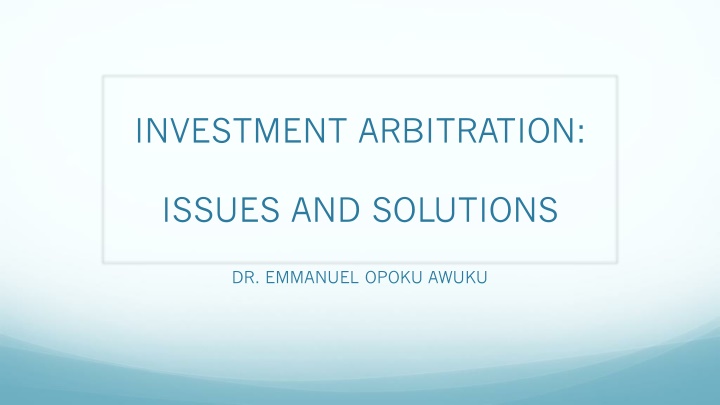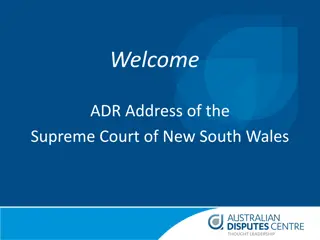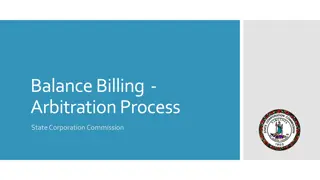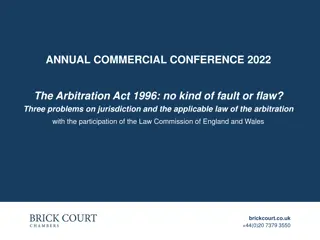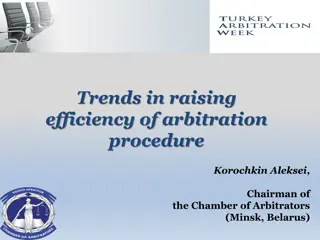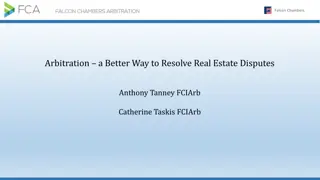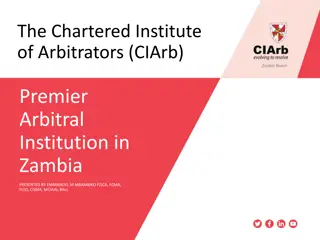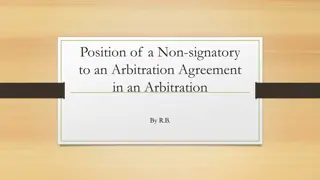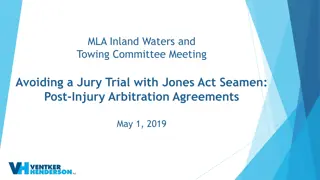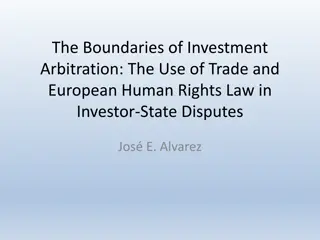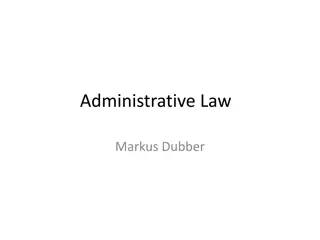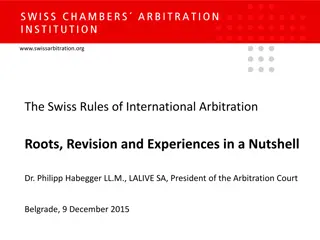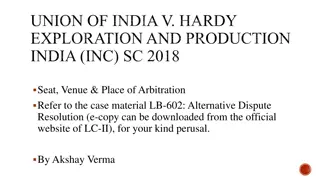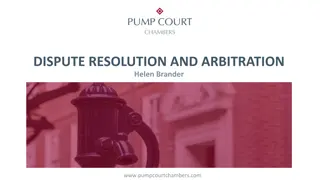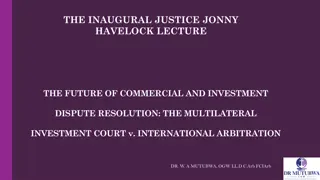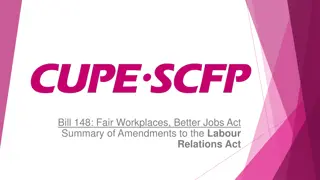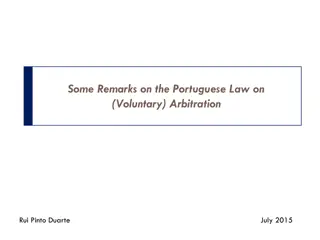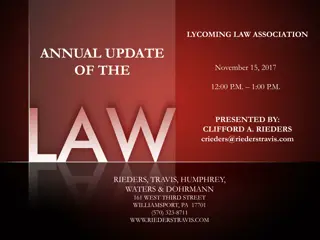Investment Arbitration: Challenges and Solutions
Legal frameworks, international investment agreements, and investor-state arbitration play crucial roles in regulating foreign investments and resolving disputes. Issues such as arbitrary expropriation and the parallel rise in disputes are addressed through mechanisms like ISDS to ensure fairness and protection for investors under international law.
Download Presentation

Please find below an Image/Link to download the presentation.
The content on the website is provided AS IS for your information and personal use only. It may not be sold, licensed, or shared on other websites without obtaining consent from the author.If you encounter any issues during the download, it is possible that the publisher has removed the file from their server.
You are allowed to download the files provided on this website for personal or commercial use, subject to the condition that they are used lawfully. All files are the property of their respective owners.
The content on the website is provided AS IS for your information and personal use only. It may not be sold, licensed, or shared on other websites without obtaining consent from the author.
E N D
Presentation Transcript
INVESTMENT ARBITRATION: ISSUES AND SOLUTIONS DR. EMMANUEL OPOKU AWUKU
Legal framework for international investment National laws to regulate and guarantee the protection of foreign investors State contracts, investment agreements, i.e. bilateral investment treaties (BITs) Double taxation treaties (DTTs) Free trade agreements including investment chapters Regional or tripartite free trade agreements (COMESA, EAC, SADC, African Continental Free Trade Agreement), and sectoral agreements Multilateral disciplines and specific agreements with investment provisions (WTO TRIMs, GATS) South-South co-operation with investment and service chapters
International investment agreements Contribute to the creation of a stable, predictable and transparent environment for international investment Reinforce economic cooperations and facilitate coordination of investment relations between host States, home States, international investors and other development stakeholders However: parallel rise in investor-state disputes
International minimum standards Principles of State responsibility for the treatment of aliens under international law: Most Favoured Nation Treatment (MFN) National Treatment (NT) Fair and Equitable Treatment (FET) and Full Protection and Security for Investors Expropriation Umbrella Clauses Survival Clauses with sunset provision Dispute settlement (state to state and investor-state arbitration) These provisions can be found in (i) Bilateral Investment Treaties (ii) International Investment Agreements (iii) Free Trade Agreements (iv) Plurilateral Agreements
Investor-state arbitration (ISDS mechanism) An instrument of public international law that grants foreign investors the right to use dispute settlement proceedings against foreign governments Aim: creating a forum that offers investors a fair hearing before an independent, neutral and qualified tribunal International investment agreements and ISDS mechanism were created: To protect investors from arbitrary expropriation To ensure international minimum standards are respected
Investor-state arbitration (ISDS mechanism) ISDS provisions are often associated with arbitration under the rules of the following: International Centre for Settlement of Investment Disputes (ICSID) of the World Bank United Nations Commission on International Trade (UNCITRAL) International Chamber of Commerce London Court of International Arbitration Stockholm Chamber of Commerce Permanent Court of Arbitration
Trends in investorstate arbitration (ISDS cases) Two types of state conduct most frequently challenged by investors: Cancellations or alleged violations of contract or concessions Revocations or denial of licenses or permits
Other challenged measures include: Legislative reform in renewable energy sector Alleged discrimination of foreign investors vis-a-vis domestic ones Alleged direct expropriations of investments Alleged failure to protect the property and provide legal protection of an investor Measures related to taxation and money laundering, regulation of exports, bankruptcy proceedings, water tariff regulations and issues concerning public policies, including environmental and health issues Tax related measures such as alleged unlawful tax assessments or the denial of tax exemptions
Breaches most frequently alleged and found Fair and equitable treatment of minimum standard of treatment Indirect expropriation Full protection and security Arbitrary, unreasonable and discriminatory measures Umbrella clause National treatment Direct expropriation
Current alleged problems with investor-state arbitration (ISDS) ISDS mechanism designed to depoliticise investment disputes Concerns regarding the current ISDS system include, among other things, the issue of transparency Contradictions between arbitral awards; difficulties in correcting erroneous arbitral decisions; questions about the independence and impartiality of arbitrators; and concern relating to costs and time of arbitral procedures ISDS provisions also allow for delocalisation of dispute resolution and allow foreign investors to bypass the local courts of host states without having to exhaust local remedies
ISDS procedures are in most cases confidential and lack transparency provisions considered to substantially reduce states freedom to regulate, creating an imbalance between the investor s right to protection and the host state s sovereign right to regulate the market Contrary to expectations, high costs linked to investment arbitration (e.g. damages, arbitrator s fees, cost of experts and witnesses, administration fees of arbitration centre)
Reason why the international investment regimes have come under security Countries like Bolivia, Ecuador and Venezuela have, for example, withdrawn from International Centre for the Settlement of Investment Disputes Morocco and South Africa have announced their decision to terminate many or all of the other International Investment Agreements (IIA) These countries are conducting a comprehensive review of the whole IIA regime, which proves challenging because of survival clauses in most of the investment treaties
Way forward to reformed investor-state arbitration (ISDS Mechanism) Promoting alternative dispute resolution (ADR), i.e. mediation methods in addition to investor-state arbitration Inclusion of regional economic organisations within the context ICSID Additional Facilities Rules Enhanced transparency, specified under UNCITRAL rules on transparency Establishment of an appellate body within the investor-state arbitration mechanism Most developing countries: investor-states disputes should be resolved through national courts, i.e. foreign investors ought not, in principle, have option to pursue investor-state dispute through international methods of dispute settlement Reassessment and renegotiation of contracts (United Nations Code of Conduct on Transnational Corporations)
South Africa Investment Protection Act: alternative route through a recourse to alternative dispute resolution to resolve investment disputes Chilean BIT model: investors and the host country should enter into consultations in respect of any disputes, but, if consultations fail, the investor may submit to competent international tribunal Cooperation and Facilitation Investment Agreement (CFIA) of Brazil: possibility of dispute prevention as a core element in an effort to facilitate and promote foreign direct investment
